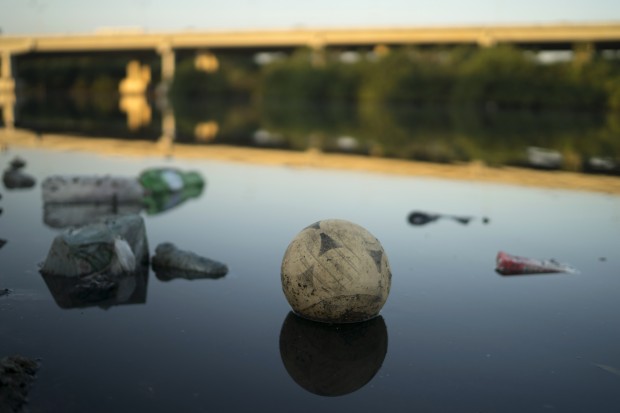
A discarded ball floats on the water in a canal at the Mare slum complex in Rio de Janeiro, Brazil, Friday, July 31, 2015. In Rio, much of the waste runs through open-air ditches to fetid streams and rivers that feed the Olympic water sites and blight the city’s picture postcard beaches. (AP Photo/Leo Correa)
RIO DE JANEIRO — The World Health Organization has asked the IOC to analyze virus levels in Rio de Janeiro’s Olympic waters, and the governing body of world sailing says it will start doing its own independent virus tests.
The moves come after an Associated Press investigation showed a serious health risk to Olympic athletes in venues around Rio rife with sewage.
In a statement to the AP, the World Health Organization said it suggested the International Olympic Committee start monitoring for viruses at the Rio venues.
“WHO has also advised the IOC to widen the scientific base of indicators to include viruses,” the statement said. “The risk assessment should be revised accordingly, pending the results of further analysis. The Rio Local Organizing Committee and the IOC are requested to follow WHO recommendations on treatment of household and hospital waste.”
A spokesman from the Rio organizing committee referred comment to the IOC, which is meeting in Kuala Lumpur, Malaysia.
“The WHO is saying they are recommending viral testing,” IOC medical director Dr. Richard Budgett told the AP. “We’ve always said we will follow the expert advice, so we will now be asking the appropriate authorities in Rio to follow the expert advice which is for viral testing. We have to follow the best expert advice.”
IOC spokesman Mark Adams added: “The health and welfare of the athletes is a top priority for the IOC. The Rio authorities are following WHO testing standards and, according to the WHO, there is no significant risk to athletes.”
The International Sailing Federation said independently it would start testing for viruses.
“We’re going to find someone who can do the testing for us that can safely cover what we need to know from a virus perspective as well as the bacteria perspective,” Peter Sowrey, chief executive of the ISAF, said. “That’s my plan.”
The sailing venue in Guanabara Bay is badly polluted, as is a separate venue for rowing and canoeing — Rodrigo de Freitas lake — in central Rio. The AP investigation also showed venues for triathlon and open-water swimming off Copacabana Beach had high virus levels that pose a threat to athletes and tourists.
Sowrey, who spoke from Kuala Lumpur, has a local interest. His wife Alesandra is a native of Rio, and he has a 9-year-old daughter Marie.
“I’m a father myself,” Sowrey said. “I want to make sure that everyone who goes out in the water is as safe as possible and is given the right guidance and right security.”
The AP analysis showed dangerously high levels of viruses and bacteria from sewage in venues where about 1,400 athletes will compete in water sports, in the games which open in a year — Aug. 5, 2016.
In Rio, much of the waste and sewage goes untreated and runs down hillside ditches and streams into Olympic water venues that are littered with floating rubbish, household waste, and even dead animals.
At the world swimming championships in Kazan, Russia, swimmers said they were worried about the situation in Rio.
“The athletes and the athletes’ commission have expressed their concern at the current problems with the quality of water, the cleanliness of the water,” Vladimir Salnikov, a former Olympic gold-medal winner, said. “That will be put into a recommendation, and people will pay attention to that.”
Shin Otsuka, an executive board member of the International Triathlon Union, said on Friday his body was considering testing for viruses.
The ITU is holding an Olympic qualifying race on Sunday using the waters off Copacabana Beach.
Costa Rican triathlete Leonardo Chacon said he knows the risks, but will take them.
“We know we are exposed to viruses, maybe to a health problem later,” he said on Friday in Rio. “But in my case, I have invested so much to prepare myself for this, and I want this to happen because I can’t recuperate this investment any other way other than competing and winning the points that I need to win.”
When Rio was awarded the Olympics in 2009, it promised cleaning its waters would be an Olympic legacy. But Rio Mayor Eduardo Paes has repeatedly acknowledged this will not be done, calling it a “lost opportunity.”
Sowrey said the ISAF would start doing its own water testing in Rio this month, no longer relying solely on Brazil’s government analysis.
“We want to make sure we keep pressure on the organizing committee and the Brazilians to make sure they put some energy into cleaning up the bay,” Sowrey said. “My job is to make sure something actually happens and it’s not just talk, and someone is actually walking the walk.”
Sowery said he received a call from a woman who wanted reassurance that the ISAF was giving the right guidance to her child and others competing in an Olympic sailing test event this month in Rio.
He said a “backup plan” included sailing all the events outside Guanabara Bay in the open Atlantic. The ISAF has three courses there, and three inside the bay.
He said it would be “‘heartbreaking” to sail outside the bay and lose the postcard backdrop of Sugarloaf Mountain, which will be a focus of television coverage.
In most Olympics, sailing is contested far from the main Olympic venues. In Rio, the sailors and rowers and canoeists get center stage — a chance to win fans and valuable sponsors.
“We’re not going to sacrifice health for the sake of good pictures and good TV,” he said. “But the backdrop of Rio is an amazing backdrop, and will do something for the sport of sailing.”